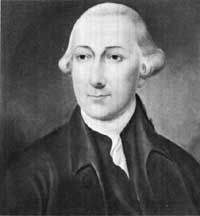Joseph Hewes was a delegate to the Continental Congress for North Carolina, and a signer of the Declaration of Independence. Hewes gave every dime he had to his country and sacrificed riches and comfort for the hardships of war, so that we could live in a free country.

Joseph Hewes, signer of the Declaration of Independence
Public domain image.
Early Life & Education
Joseph Hewes was born on January 23, 1730 in Kingston, New Jersey. Not much is known about his early life, until Joseph was old enough to attend college. He studied at what is now known as Princeton University. In 1760, Hewes started a quite successful shipping company in Wilmington, North Carolina.
Revolution & Politics
As talk of the revolution became less talk and more rebellion, Joseph’s business prospered, making him quite wealthy. In 1766, Joseph started to take on an active role in the political circles blooming around him. That year, he was elected to the provincial assembly, where he served until it was dissolved in 1775 by the Royal Governor. Almost immediately after the assembly was gone, Joseph was appointed to the committee of correspondence. Later that year, he was elected to the Continental Congress.
In Congress, Joseph Hewes stood out because of his work ethic and tireless labor with no complaint. Everything he worked on, he put every bit of effort he had into and was soon well-known in Congress as a hard worker.
In 1776, Joseph Hewes signed the Declaration of Independence. Just after the document was signed, Joseph sent all of his trade ships to the Continental Army to be used as warships in a grand and generous show of support. Shortly thereafter, Joseph was appointed Secretary of Naval Affairs.
In 1779, Joseph had to part with his duties because he had fallen terribly ill. Although many hoped he would recover and return to his station, he passed away on November 10, 1779. Joseph Hewes gave everything he had for his country: his time, his money, his assets, and his health. His ships were a critical contribution to the Continental Fleet. He risked his financial future and even his very life to support his ideals of liberty.


